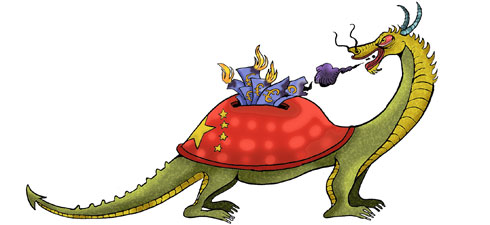Once upon a time, Europe colonised bits of China. Today, China colonises bits of Europe. Informally, of course, and much more politely than when the boot was on the other foot. China's rise both illuminates and exploits Europe's relative decline.
When prime minister Wen Jiabao comes to Europe, he will visit Germany, Britain and Hungary. Why Hungary? Partly because it holds the rotating presidency of the EU but also because China has large investments there and aims to make more – as it does elsewhere in south-eastern and southern Europe. A forthcoming study by the European Council on Foreign Relations (ECFR) estimates that 40% of Chinese investment in the EU is in Portugal, Spain, Italy, Greece and eastern Europe.
Why pay so much attention to the periphery? Well, there are promising investments to be made there and these smaller, peripheral economies are an easy way in to a single European market of 500 million consumers. The EU market is far more open to Chinese investors than the Chinese one is to Europeans.
Investing heavily in these countries also has a political pay-off. It is not too cynical to see Beijing building up a kind of China lobby inside the decision-making structures of the EU, where the smallest state is at least notionally equal to the biggest.
Read the rest of the article at The Guardian...
Debt crisis
Beijing's priceless billions
“It wasn’t so long ago that a visit by a Chinese premier was synonymous with protests and debates on human rights and repression in Tibet,” El País observes. However, notes the Spanish daily, “these days, Wen Jiabao’s visit to Hungary, the United Kingdom and Germany is seen almost solely through the prism of the importance that the Asian giant has for the European economy. The guest even took the liberty of lecturing his host on the risks of trying to impose peace in Libya at gunpoint. Prudently, on the eve of the visit the Chinese released several dissidents, including the artist Ai Weiwei.”
“When Wen Jiabao last visited the UK in 2009 a student threw a shoe at him while he was giving a speech at the University of Cambridge. Now, two years and one crisis later, Wen has promised Budapest that China will not give up on Europe. In Birmingham he walked into a Chinese car factory as if he were at home, and on June 28 he was scheduled to discuss the vicissitudes of the euro with Angela Merkel. All this topped with billions of euros in contracts.”
El País adds that Beijing’s acquisition of debt securities of struggling eurozone countries, such as Spain, Ireland, Portugal and Greece, has revived European sympathies and business instincts. So has its thirst for technology. That is why, the paper concludes, “Europe is delighted to help out – even if it has to hold its nose and look the other way when it must. It’s called pragmatism, and it’s always been with us.”
Was this article useful? If so we are delighted!
It is freely available because we believe that the right to free and independent information is essential for democracy. But this right is not guaranteed forever, and independence comes at a cost. We need your support in order to continue publishing independent, multilingual news for all Europeans.
Discover our subscription offers and their exclusive benefits and become a member of our community now!












